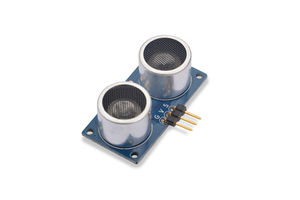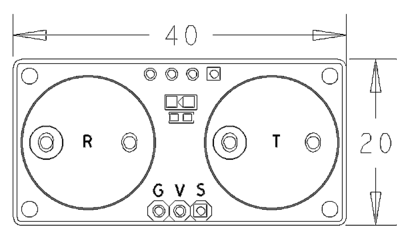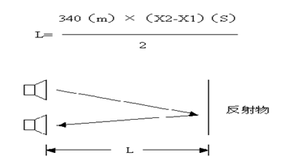Difference between revisions of "Matrix - Ultrasonic Ranger"
Adminhammer (talk | contribs) m (1 revision imported) |
Adminhammer (talk | contribs) |
||
| Line 1: | Line 1: | ||
| − | |||
| − | |||
==Introduction== | ==Introduction== | ||
[[File:UltrasonicRanger01.png|thumb|Ultrasonic Ranger01]] | [[File:UltrasonicRanger01.png|thumb|Ultrasonic Ranger01]] | ||
Latest revision as of 05:02, 10 February 2016
Contents
Introduction
- The Matrix-Ultrasonic_Ranger is used to measure the distance.
- The module's sensor emits a sound wave, which bounces off a reflective surface and returns to the sensor. Then, using the amount of time it takes for the wave to return to the sensor, the distance to the object can be computed.
Features
- 5V Power
- Range: 5 cm - 300 cm,Accuracy: 1 cm
- One wire gpio
- PCB Dimension (mm): 20 x 40
- Pin Description:
| Pin | Description |
| S | GPIO |
| V | Supply Voltage 5V |
| G | Ground |
Basic Device Operation
- The sensor emits a 40kHz, 6 mm sound wave, which bounces off a reflective surface and returns to the sensor. The receiver converts ultrasound waves to electrical signals in mV.
- The master sends a signal to the module starting to emit a sound wave. After the module receives the returned signal it will will generate a high level indicating the elapsed time and the distance will be calculated by distance = (elapsed time * speed of sound)/2.
Download Matrix Source Code
All the matrix modules' code samples are open source. They are maintained on GitHub - https://github.com/friendlyarm/matrix.git
Each branch in this hub contains the matrix modules' code samples for a board that the matrix modules can work with.
- The nanopi branch contains the matrix modules' code samples for the NanoPi
- The tiny4412 branch contains the matrix modules' code samples for the Tiny4412
- The raspberrypi branch contains the matrix modules' code samples for the RaspberryPi
Please follow the steps below to get the source code:
Install the git utility on a PC running Ubuntu14.04
$ sudo apt-get install gitClone the matrix code from GitHub
$ git clone https://github.com/friendlyarm/matrix.gitIf this is successful a "matrix" directory will be generated, which will contain all the matrix modules' code samples.
Connect to NanoPi
Preparations
Please install a Debian on a NanoPi and an appropriate cross compiler on a PC. Please refer to wiki: NanoPi
Compile a NanoPi kernel. Note: please use the kernel's source code from the nanopi-v4.1.y-matrix branch.
$ git clone https://github.com/friendlyarm/linux-4.x.y.git
$ cd linux-4.x.y
$ git checkout nanopi-v4.1.y-matrix
$ make nanopi_defconfig
$ touch .scmversion
$ make
Hardware Connection
Please refer to the following connection diagram to connect the Matrix-Ultrasonic_Ranger to the NanoPi
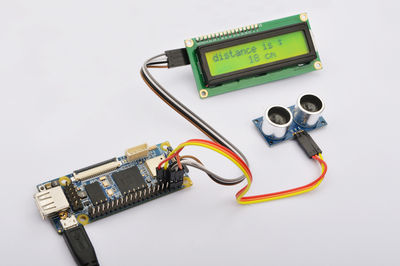
Connection Details:
| Matrix-Sound_Sensor | NanoPi |
| S | Pin7 |
| V | Pin4 |
| G | Pin6 |
Compile Test Program
Please login the matrix hub and enter the nanopi branch
$ cd matrix
$ git checkout nanopiCompile the matrix code
$ make CROSS_COMPILE=arm-linux- clean
$ make CROSS_COMPILE=arm-linux-
$ make CROSS_COMPILE=arm-linux- installNote: please make sure to install the cross compiler "arm-linux-gcc-4.4.3" on your PC, which is used to compile files for the NanoPi-Debian.
Generated library files are under the "install/lib" directory. Applications are under the "install/usr/bin" directory. The test program for the "Matrix-Ultrasonic_Ranger" module is "matrix-ultrasonic_ranger".
Run Test Program
Please copy the library files and test program to the NanoPi
$ cp install/usr/bin/* nanopi_rootfs/usr/bin/
$ cp install/lib/* nanopi_rootfs/lib/ -dPower on the NanoPi and run the following command in Debian's terminal
Note: this module is not plug and play therefore before running the module please make sure it is connected to a NanoPi.
$ matrix-ultrasonic_rangerCode Sample
int main(int argc, char ** argv)
{
int distance = -1;
int pin = GPIO_PIN1;
if (Hcsr04Init(pin) == -1) {
printf("Fail to init hcsr04\n");
}
if (Hcsr04Read(&distance) != -1) {
printf("Get distance: %3d cm\n", distance);
} else {
printf("Faid to get distance\n");
}
Hcsr04DeInit();
return 0;
}Connect to Tiny4412
Preparations
Please refer to the Tiny4412's user's manual to install a UbuntuCore on the Tiny4412 and install an appropriate cross compiler on a PC.
Note: only the Tiny4412SDK-1506 carrier board can work with this module.
Hardware Connection
Please refer to the following diagram to connect the Matrix-Ultrasonic_Ranger to the Tiny4412
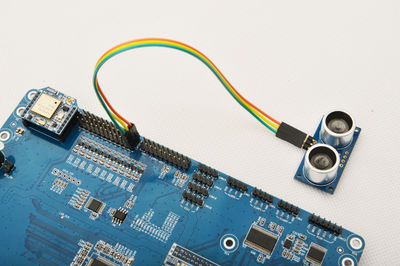
Connection Details:
| Matrix- Ultrasonic Ranger | Tiny4412 |
| S | GPIO1 S |
| V | GPIO1 5V |
| G | GPIO1 GND |
Compile Test Program
Please login the Matrix hub and enter the matrix-tiny4412 branch
$ cd matrix
$ git checkout tiny4412Compile the matrix code
$ make CROSS_COMPILE=arm-linux-gnueabihf- clean
$ make CROSS_COMPILE=arm-linux-gnueabihf-
$ make CROSS_COMPILE=arm-linux-gnueabihf- installNote: please make sure to install the cross compiler "arm-linux-gnueabihf-gcc-4.7.3" on your PC, which is used to compile files for the Tiny4412-UbuntuCore.
Generated library files are under the "install/lib" directory. Applications are under the "install/usr/bin" directory. The test program for the "Matrix-Ultrasonic_Ranger" module is "matrix-ultrasonic_ranger".
Run Test Program
Please copy the library files and test program to the Tiny4412
$ cp install/usr/bin/* tiny4412_rootfs/usr/bin/
$ cp install/lib/* tiny4412_rootfs/lib/ -dPower on the Tiny4412 and run the following command in UbuntuCore's terminal
Note: this module is not plug and play therefore before running the module please make sure it is connected to a Tiny4412.
$ matrix-ultrasonic_rangerCode Sample
int main(int argc, char ** argv)
{
int distance = -1;
int pin = GPIO_PIN1;
if (Hcsr04Init(pin) == -1) {
printf("Fail to init hcsr04\n");
}
if (Hcsr04Read(&distance) != -1) {
printf("Get distance: %3d cm\n", distance);
} else {
printf("Faid to get distance\n");
}
Hcsr04DeInit();
return 0;
}